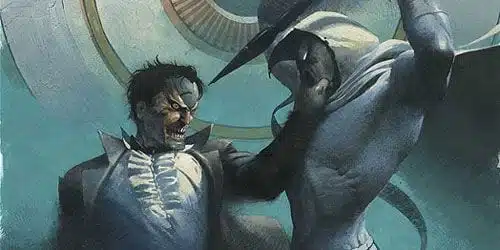
Leave it to Moon Knight to tell his own tale of choosing sides and weighing right and wrong, alongside yet separate from the larger Marvel Universe storyline of the “Civil War” and its aftermath.
Not that “Civil War” and its cast of characters don’t play a large role in Midnight Sun, writer Charlie Huston’s follow-up to his six-issue opening salvo on Moon Knight. He’s bringing in heroes and anti-heroes alike to let Marc Spector know exactly where he stands in relation to the rest of the superhero community.
And where he stands is, in the beginning and by his own design, a pretty lonely place. At least in those times when his god of vengeance and the moon, in the guise of mutilated arch-enemy Bushman, isn’t adding a running commentary to whatever Spector happens to be doing. Or is what seems to be Khonshu just one more shard of a fragmented identity whispering inside of Spector’s mind? It was well-established long ago in Marvel continuity that Spector’s grip on reality is a bit sketchy.
Crime novelist Charlie Huston, recruited by Marvel as part of an ongoing industry campaign to rev up the superhero genre, can handle characters with sketchy holds on reality. He can even wax eloquent on the madness and mayhem and give it a few kicks (right in the ribs, maybe breaking a few in the process) of slapstick.
Huston is well-known for two-fisted tales, anti-heroes readers can relate to, and noir; his dialogue and pacing mixes very well with the Moon Knight mythos. All the fragments of Marc Spector’s mind, the multiple identities he’s assumed through the years, boil down to the fact that this is a man who did very bad things long ago, before he made the decision to try to be a better man. What do you do with ugly memories that keep reminding you of what you once were? How do you quiet that howling chorus of accusers in the mirror?
It starts with a good, long look in that mirror, figuratively speaking.
A steady stream of guest appearances marks the “Midnight Son” storyline. Even as Moon Knight confronts the return of a former sidekick turned maniacal serial killer, he finds himself face-to-face with one hero after another.
Spider-Man shakes his head in astonishment at the sheer ferocity of Moon Knight’s way of dealing with the criminals he encounters. Captain America (this occurs prior to the conclusion of “Civil War”) makes it a point to have a word, soldier to Marine, with Spector. The compare and contrast nature of the guest appearances hits home most directly when Moon Knight confronts the Punisher.
They’ve both killed people, but Moon Knight has killed far fewer. As he himself says, he could probably come up with a number, whereas the Punisher likely lost count long ago. It’s a rough way to frame Moon Knight’s position on the vigilante path: he’s no Captain America but then again, he’s not the Punisher. That leaves him considerable space to work within, anyhow.
And there is work to be done. Midnight is the name of the nasty ghost from Spector’s past (with a new penchant for dismemberment) out to make a bloody name for himself as Moon Knight’s new arch-enemy. He’s not just out to kill Moon Knight, he’s out to humiliate him, snuff out his spirit, and avenge his own feelings of shame and inadequacy in the process. That makes for a particularly ugly kind of smack down.
Along the periphery lurks the Profile, who is capable of reading intentions, failings, and secrets with a glance. It’s a nice touch; a supporting character appropriate for a tale of a man not far away from rock-bottom who is out to reclaim a place in the world of heroes.
This story is heavy on the soul-searching. Luckily for action fans, Moon Knight does his best soul-searching while cracking the teeth of those who prey on innocents.
There are shades of the classic Doug Moench and Bill Sienkiewicz Moon Knight stories of the 1980s in Huston’s take on the character. Much of the story centers on what is left in Spector’s world of the stuff of that earlier time. The players, those who are still among the living, are back on the game board, some wanting back in, some wanting no more of Spector’s world, and some who have no say in the matter.
And that’s the really cruel twist to Spector’s situation: if he hopes to hold his own recent abyss at a distance, he’ll need to let a few friends in. But friends of Moon Knight have a tendency to get torn to pieces . . . and that part is not necessarily in the figurative sense.
